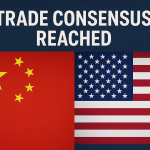In a significant diplomatic development, China’s top trade negotiator has announced that Beijing and Washington have reached a “preliminary consensus” during high-level trade discussions held in Kuala Lumpur. The meeting marks a cautious step forward in efforts to stabilize economic relations between the world’s two largest economies amid ongoing tensions over tariffs, export controls, and security concerns.
Talks Focused on Trade and Technology
According to official statements released after the meeting, the talks covered a broad range of issues, including tariff reductions, export control policies, fentanyl trafficking, and technology transfer rules. Both sides reportedly expressed willingness to maintain “constructive dialogue” and to avoid further escalation in the trade dispute that has strained global markets for the past several years.
Chinese Vice Premier Li Qiang, who led the delegation, emphasized that “open communication and practical cooperation” remain the only viable paths to restore stability in bilateral trade. He highlighted China’s readiness to “work towards mutually beneficial outcomes” while defending its core national interests.
U.S. Seeks Balance Between Competition and Cooperation
The U.S. delegation, represented by Commerce Secretary Gina Raimondo and Trade Representative Katherine Tai, reiterated Washington’s position that the United States welcomes healthy competition but seeks to prevent unfair trade practices and overreliance on critical supply chains.
Raimondo noted that the meeting helped to “lower tensions and clarify expectations”, particularly in areas like semiconductor export controls and fentanyl precursor regulation — a key concern for the U.S.
Global Market Reaction
Following reports of the preliminary consensus, Asian stock markets showed modest gains, and the Chinese yuan strengthened slightly against the dollar. Analysts believe the agreement, though limited in scope, could pave the way for more structured talks later this year, possibly ahead of the APEC Summit.
Dr. Richard Kim, an international trade analyst based in Singapore, commented:
“While this is far from a breakthrough, the fact that both sides are signaling cooperation is a positive step. It reduces uncertainty and may prevent new tariff escalations.”
Fentanyl and Security Discussions
A notable part of the talks included discussion on the fentanyl crisis, which the U.S. blames in part on Chinese-origin chemical exports. China pledged to tighten oversight of pharmaceutical exports and collaborate with international partners to curb illicit drug trafficking.
The two sides also discussed supply chain resilience, particularly in critical sectors such as semiconductors, green technology, and rare-earth minerals — areas where both countries are vying for technological and strategic dominance.
Looking Ahead
Both nations agreed to continue dialogue through a joint working group, with the next round of meetings expected in early 2026.
While no formal trade deal has been signed, the spirit of cooperation expressed in Kuala Lumpur marks a notable departure from the confrontational rhetoric that dominated the past few years.
As the global economy continues to navigate inflationary pressures and supply chain disruptions, experts say that even small steps toward stability in U.S.–China relations could have meaningful global implications.
Related posts:
AI-powered cybercrime is rising fast in India, endangering its $5-trillion economic goal. Learn how innovation and security must go hand in hand.
Discover trusted wedding venues and verified vendors on WeddSmart.com. Plan smarter, compare options, and create unforgettable celebrations with ease.


 AI-Driven Cybercrime Threatens India’s $5-Trillion Dream
AI-Driven Cybercrime Threatens India’s $5-Trillion Dream
 How to Find the Perfect Wedding or Event Venues & Vendors on WeddSmart.com
How to Find the Perfect Wedding or Event Venues & Vendors on WeddSmart.com
 China and U.S. Reach Preliminary Consensus in Kuala Lumpur Trade Talks
China and U.S. Reach Preliminary Consensus in Kuala Lumpur Trade Talks
 Twin Cyclones Brewing Over Indian Seas: “Cyclone Montha” Likely to Form Soon
Twin Cyclones Brewing Over Indian Seas: “Cyclone Montha” Likely to Form Soon
 Brazilian Vice President Arrives in India for Three-Day Official Visit
Brazilian Vice President Arrives in India for Three-Day Official Visit